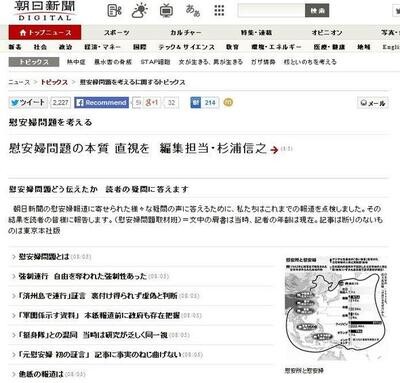hankyoreh
Links to other country sites 다른 나라 사이트 링크
Japanese newspaper says, “Let’s face reality” regarding comfort women

By Cho Ki-weon, staff reporter
On Aug. 5, Japanese newspaper the Asahi Shimbun devoted a front-page column and articles spanning two pages of newspaper space to the comfort women. “Deprivation of human dignity is at the heart of the comfort women problem,” the paper said, firing a shot across the bow of Japanese right-wingers who have been seeking to evade responsibility for the comfort women.
Since the early 1990s, the newspaper has taken the lead in drawing attention inside Japan to the issue of the comfort women, a euphemistic term for women forced to work as sex slaves by the Japanese imperial army. In its Aug. 5 edition, the paper printed a one-page column titled, “Let’s Face the Reality of the Comfort Women Issue.”
“The tone adopted by some newspapers implying that the honor of Japan can be defended by disparaging the comfort women as prostitutes is only making the problem worse by inflaming nationalism in both Japan and South Korea. We cannot erase the fact that, during the war, women were forced to become sex partners for Japanese soldiers. The heart of the problem is that the comfort women were robbed of their freedom, and that their dignity as women was trampled upon,” the paper said.
After Prime Minister Shinzo Abe came to power, the Japanese government published the results of a review that undercut the 1993 Kono Statement, which had acknowledged the forcible nature of the mobilization of the comfort women by the Japanese imperial army, while far-right papers such as the Sankei Shimbun ran reports seeking to negate Japan’s responsibility.
Referring to the Abe administration’s publication of this review and claims by certain newspapers that the comfort women issue had been fabricated by the Asahi Shimbun, the newspaper announced that it was printing a series of feature articles to rebut this groundless criticism.
A two-pages of analytical pieces examined in detail the evidence unearthed so far about how women were forced to become sexual slaves and the controversy about the compulsory nature of their recruitment. “There were many cases in Korea and Taiwan - which were under Japanese colonial occupation at the time - of business operators hired by the military luring women to join them by telling them that they had a good job for them,” the newspaper said.
The newspaper acknowledged that no official documents have been discovered that directly demonstrated that the army had forced women into sexual slavery. However, it continued, there are records of the imperial Japanese army violently pressing local women into service in the Philippines and Indonesia, which were occupied by the Japanese at the time. “A 2002 report by the Philippine government even describes a case in which the Japanese army in the Philippines seized a local woman, detained her, and repeatedly gang-raped her,” the paper said.
“The common thread in all of these countries is how women were forced to become comfort women against their will,” the newspaper emphasized.
At the same time, the Asahi Shimbun said that it was retracting articles that it had run in the 1980s and 1990s based on the testimony of a Japanese writer named Seiji Yoshida, who claimed to have abducted a number of women on Jeju Island during World War II. In their attacks on Asahi Shimbun reports on the comfort women, the Sankei Shimbun and other papers have argued that Yoshida’s claims are false.
“We regret the fact that there were factual inaccuracies in some of our articles printed in the early 1990s, which was before much research had been done on the comfort women. However, we do not agree with the argument that this means the comfort women problem does not exist, or that there is no reason to apologize to the victims of the comfort women system,” the newspaper said.
Please direct questions or comments to [english@hani.co.kr]

Editorial・opinion
![[Column] Season 2 of special prosecutor probe may be coming to Korea soon [Column] Season 2 of special prosecutor probe may be coming to Korea soon](https://flexible.img.hani.co.kr/flexible/normal/500/300/imgdb/original/2024/0426/3317141030699447.jpg) [Column] Season 2 of special prosecutor probe may be coming to Korea soon
[Column] Season 2 of special prosecutor probe may be coming to Korea soon![[Column] Park Geun-hye déjà vu in Yoon Suk-yeol [Column] Park Geun-hye déjà vu in Yoon Suk-yeol](https://flexible.img.hani.co.kr/flexible/normal/500/300/imgdb/original/2024/0424/651713945113788.jpg) [Column] Park Geun-hye déjà vu in Yoon Suk-yeol
[Column] Park Geun-hye déjà vu in Yoon Suk-yeol- [Editorial] New weight of N. Korea’s nuclear threats makes dialogue all the more urgent
- [Guest essay] The real reason Korea’s new right wants to dub Rhee a founding father
- [Column] ‘Choson’: Is it time we start referring to N. Korea in its own terms?
- [Editorial] Japan’s rewriting of history with Korea has gone too far
- [Column] The president’s questionable capacity for dialogue
- [Column] Are chaebol firms just pizza pies for families to divvy up as they please?
- [Column] Has Korea, too, crossed the Rubicon on China?
- [Correspondent’s column] In Japan’s alliance with US, echoes of its past alliances with UK
Most viewed articles
- 1‘We must say no’: Seoul defense chief on Korean, USFK involvement in hypothetical Taiwan crisis
- 2[Column] Season 2 of special prosecutor probe may be coming to Korea soon
- 3N. Korean delegation’s trip to Iran shows how Pyongyang is leveraging ties with Moscow
- 4Korea sees more deaths than births for 52nd consecutive month in February
- 5Amnesty notes ‘erosion’ of freedom of expression in Korea in annual human rights report
- 6[Reportage] On US campuses, student risk arrest as they call for divestment from Israel
- 7[Editorial] New weight of N. Korea’s nuclear threats makes dialogue all the more urgent
- 8‘Weddingflation’ breaks the bank for Korean couples-to-be
- 9[Column] Has Korea, too, crossed the Rubicon on China?
- 10[Column] Park Geun-hye déjà vu in Yoon Suk-yeol